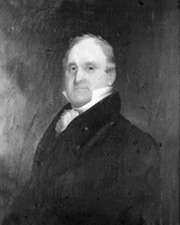James Lanman
| James Lanman | |
|---|---|
|
"The Honorable James Lanman (1769-1841), B.A. 1788, M.A. 1791" by Chester Harding courtesy Yale University Art Gallery | |
| United States Senator from Connecticut | |
|
In office March 4, 1819 – March 4, 1825 | |
| Preceded by | David Daggett |
| Succeeded by | Calvin Willey |
| 8th United States Senate | |
| Personal details | |
| Born |
June 14, 1767 Norwich, Connecticut |
| Died |
August 7, 1841 (aged 74) Norwich, Connecticut |
| Political party | Democratic-Republican, Crawford Republican |
| Alma mater | Yale College |
| Profession | Lawyer |
James Lanman (June 14, 1767 – August 7, 1841) was an American lawyer and politician from Connecticut who served in the United States Senate.[1]
Early life and education
James Lanman was the eldest of the seven children of Peter Lanman Jr., of Norwich, Connecticut and Sarah Coit Lanman. The first of many generations of Lanmans who attended what is now known as Yale University, James Lanman pursued classical studies and graduated Phi Beta Kappa from Yale College in 1788. Lanman studied law and was admitted to the bar in 1791, beginning his practice in his hometown of Norwich "where he acquired great local distinction for his eloquence and general ability".[2] We get an interesting glimpse of James Lanman as a young man of 20 through the diary of John Quincy Adams, who was two years his senior and rode with him on a stage from Boston to Providence on September 8, 1789: "I had two companions; one a Mr. Wright from North Carolina, and the other a young man from Connecticut by the name of Lanman. We were tolerably sociable. Lanman sung a number of songs of his own accord, and sung very well. But, upon being requested by Mr. Wright to continue, he altogether denied that he could sing at all."[3] When his father, shipping magnate Peter Lanman, died in 1804, James inherited and moved into his childhood home, the now historic "Peter Lanman House" on Main Street, for the rest of his life.[4] A nearby tavern (now the Norwich Savings Society) at "Peter Lanman's Corner", at Main and Broadway in Norwich, is of interest because George Washington stayed there in 1775.
James Lanman married Marian Chandler on May 18, 1794 and had four sons and eight daughters. Widowed in 1817, Lanman married his second wife, Mary Judith (Gall) Benjamin, on October 26, 1826. He had no children by his second marriage.[5]
Public Office
He was elected to the State house of representatives in 1817, as a delegate to the State constitutional convention in 1818, then to the State senate in 1819. Lanman was elected to the United States Senate as a Democratic Republican (later Crawford Republican) and served from March 4, 1819, to March 4, 1825. As a Senator he chaired the Committee to Audit and Control the Contingent Expenses (Seventeenth Congress), The Committee on Engrossed Bills (Seventeenth and Eighteenth Congresses), and the Committee on Post Office and Post Roads (Eighteenth Congress). Lanman was a judge of the State superior and supreme courts from 1826–1829 and the mayor of Norwich from 1831-1834.
Lanman was known as the last Senator to wear a powdered wig, ruffled shirts and knee breeches. His grandson, Charles Lanman, private secretary to Daniel Webster, said that, "My grandfather, James Lanman, voted with the South on the Missouri Compromise and was burned in effigy in his native town, Norwich, but his broad patriotism won from him the warmest friendship of Henry Clay and Thomas H. Benton."[6]
Notable Orations
Lanman published a notable Fourth of July address to the citizens of Norwich on the 22nd anniversary of United States independence in 1798.[7] While Mayor of Norwich, Lanman gave a speech commemorating the centennial anniversary of George Washington's birthday on March 1, 1832 entitled "A Discourse, Addressed to the Citizens of Norwich",[8] which reviews Washington's military and civic contributions to the founding of the United States.
Lanman died in Norwich, Connecticut at age 75 and is interred in the City Cemetery.
See also
References
- ↑ Online edition Biographical Directory of the United States Congress
- ↑ Dexter, Franklin Bowditch (1907). Biographical Sketches of the Graduates of Yale College with Annals of the College History, Vol. 4, July , 1778 - June, 1792. H. Holt and company. pp. 608–609. ISBN 1-55963-088-4.
- ↑ Adams, John Quincy (1791). The Diaries of John Quincy Adams, Vol. 16 (Reprinted in the Proceedings of the Massachusetts Historical Society, Second Series, Vol. 16, 1902). pp. 455–459.
- ↑ "Peter Lanman House on Norwich Heritage Trust website". Retrieved 2009-09-29.
- ↑ Stone, Don Charles (1968). The Lanman Family - The Descendants of Samuel Landman of Boston, Massachusetts, 1687. Don Charles Stone, Lancaster, Pennsylvania. pp. 21–25.
- ↑ Ferris, Mary L. D. (1899). George C. Atwell, H. Phelps Arms, ed. "The Letters of a United States Senator, Private Correspondence of Judge James Lanman of Norwich, Connecticut, the Last Senator to Wear Powdered Wigs, Knee Breeches and Ruffled Shirts - Sidelights on the Discussions of the Day". The Connecticut Magazine: An Illustrated Monthly. The Connecticut Magazine Company, Hartford, Connecticut. 9: 808.
- ↑ Lanman, James (1798). "An Oration, Pronounced on the Twenty-Second Anniversary of American Independence, Before the Citizens of Norwich" (PDF). Thomas Hubbard, Norwich, Connecticut. p. 22.
- ↑ Lanman, James (1832). "A Discourse, Addressed to the Citizens of Norwich." (PDF). W. Faulkner, Norwich, Conn.
This speech by James Lanman, preserved by the Library of Congress, provides a sense of American patriotism and pride in the early nineteenth century.
External links
| United States Senate | ||
|---|---|---|
| Preceded by David Daggett |
U.S. Senator (Class 3) from Connecticut 1819–1825 Served alongside: Samuel W. Dana, Elijah Boardman, Henry W. Edwards |
Succeeded by Calvin Willey |

